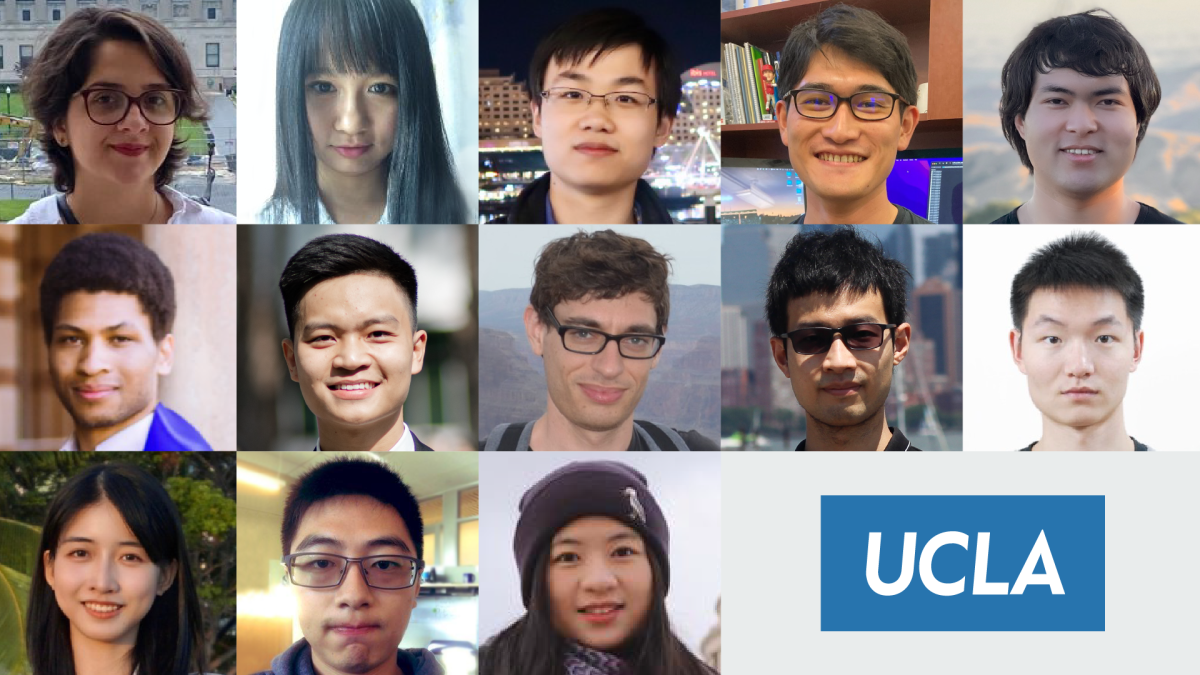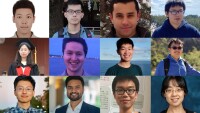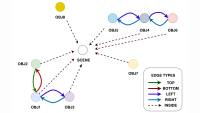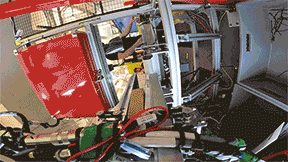The Science Hub for Humanity and Artificial Intelligence, launched in October 2021 to facilitate collaboration between academic researchers and Amazon scientists, today announced the second cohort of Amazon Fellows. The fellowships are aimed at graduate students pursuing research into artificial intelligence and its impact on society.
The fellowships provide PhD students at UCLA Samueli School of Engineering with up to two quarters of funding during the academic year to pursue independent research projects. The Amazon Fellows study within the departments of computer science, electrical and computer engineering, bioengineering, and mechanical and aerospace engineering. In addition to project funding, they will be invited to apply to intern at Amazon.

What follows is the list of fellows, their areas of research, and their UCLA faculty advisors:
Sanae Amani Geshnigani is pursuing a PhD in electrical and computer engineering; her advisor is Lin Yang, assistant professor of electrical and computer engineering.
“My research goal is to expand the applicability of bandit and reinforcement learning algorithms to new application domains: specifically, safety-critical and distributed physical systems, such as robotics, wireless networks, the power grid and medical trials.”
Kewei Cheng, is pursuing a PhD in computer science; her advisor is Yizhou Sun, professor of computer science.
“My research interests mainly focus on knowledge graph reasoning with a specific concentration on neural-symbolic reasoning, and more generally in machine learning and network science.”
Zi-Yi Dou is pursuing a PhD in computer science; his advisor is Nanyun Peng, assistant professor of computer science.
“My research has been centered around advancing the field of artificial intelligence with an aim of helping people around the globe by allowing computers to interact with them through natural language and help them accomplish tasks. State-of-the-art models still struggle with gathering information from diverse modalities and languages, and generalizing well to novel scenarios. To overcome these limitations, my current research goal is to build robust multimodal and multilingual AI models and comprehensively evaluate them along multiple dimensions and domains.”
Kai Fukami is pursuing a PhD in mechanical and aerospace engineering; his advisor is Kunihiko Taira, professor, computer science.
“My academic interest belongs to fluid dynamics which is a discipline to study flows around us such as air and water. In particular, I am working on the design of artificial-intelligent techniques and machine-learning methods to understand and control turbulent flows from limited sensor measurements.”
Luzhe Huang is pursuing a PhD in electrical and computer engineering; his advisor is Aydogan Ozcan, Chancellor's Professor and the Volgenau Chair for Engineering Innovation.
“In the past decade, AI has revolutionized many fields, including robotics, computer vision, and natural language processing, and greatly improved our daily life. When it comes to microscopy imaging, despite some researches exploring the integration of AI and microscopy imaging, critical challenges remain for real-world applications and prevent the advance of AI to benefit a broad group of users in biology, pathology and medical science. I am fortunate to be studying on this frontier of human’s knowledge and develop technologies to conquer these challenges using my interdisciplinary knowledge in both AI and optics.”
Alexander Johnson, is pursuing a PhD in electrical and computer engineering; his advisor is Abeer Alwan, professor of electrical and computer engineering.
“My research focuses on improving speech technology performance for children’s speech and African American English (AAE) speech in order to provide more equitable outcomes in early education. Speech technologies perform well for certain demographics (ie. able-bodied, adult, first-language speakers of mainstream dialects). However, they perform much worse for underrepresented groups (eg. young children, speakers of non-mainstream dialects, people with speech-related disabilities, etc.). Child speakers of AAE often show poorer reading and oral language performance than their white counterparts as a result of the orthographic mismatch between their spoken dialect and mainstream American English (MAE) taught in their classrooms. ASR systems trained to recognize AAE could give these students additional teaching support and help bridge this performance gap. However, this is a difficult low-resource problem given the small number of publicly available, labeled datasets for AAE speech in comparison to those for MAE speech. Thus, novel methods for low-resource dialects are needed in order to bring ASR systems for AAE-speaking children to the level of current data-driven ASR approaches for MAE.”
Tung Nguyen is pursuing a PhD in computer science; his advisor is Aditya Grover, assistant professor of computer science.
“Deep learning has grown rapidly in both scale and generalizability over the past decade. However, the majority of the real-world advances are made in the field of vision or language, while sequential decision-making paradigms such as reinforcement learning (RL) have lagged behind and only showed limited successes for controlled domains such as games. Sequential decision making in the real world is more challenging, because 1) the inputs are high-dimensional with long-range spatiotemporal dependencies; 2) agents need to quantify uncertainty to balance exploration and exploitation; and 3) active online interactions with the environment can be very expensive or even infeasible in high-stakes applications. My research goal is to address these challenges, and thereby enable robust sequential decision making for real-world applications. I outline my past research and future plans below.”
Alexander Schperberg is pursuing a PhD in mechanical and aerospace engineering; his advisor is Dennis Hong, professor of mechanical and aerospace engineering.
“My goal is to facilitate the dream of one day seeing diverse sets of wheeled, aerial, legged, and underwater robots being used ubiquitously towards reducing the burdens of society. Robotics and AI technology have the enormous potential to support humanity by performing tasks too dangerous for human workers, or through human-robot interactions. Unfortunately, while the potential use of robotics is an exciting prospect, they are still not commonly used due to a justified concern for both their safety and cost. For example, to make robots safer typically demands high-fidelity sensor and computer components. Thus, these robots are very expensive and are still seen as a luxury item rather than a product for everyday use. More troubling is that those from economically challenged and/or underprivileged groups may not have access and potentially cannot reap the benefit from this technology. Ideally, creating new robots using off-the-shelve or inexpensive components would greatly expand the robotic field and rapidly benefit society for all.”
Zhouxing Shi is pursuing a PhD in computer science; his advisor is Cho-Jui Hsieh, associate professor of computer science.
“My research interest is trustworthy machine learning and responsible AI, and I am currently working on the formally verifiable robustness of machine learning models especially neural networks.”
Zhaoqiang Wang is pursuing a PhD in bioengineering; his advisor is Liang Gao, assistant professor of bioengineering.
“Cardiovascular diseases (CVDs) are the leading cause of death globally, taking an estimated 17.9 million lives each year. In the United States, it is reported that approximately 82.6 million people currently live with at least one type of CVD, which contributes to a significant healthcare burden. To elucidate the underlying mechanism, researchers replicate the cardiac disease model in well-established genetic systems such as mouse and zebrafish. These model animals possess the essential common physiology as humans, but intelligent microscopy is critically necessary to reveal their heart morphology and dynamics.”
Yu Yang is pursuing a PhD in computer science; her advisor is Baharan Mirzasoleiman, assistant professor of computer science.
“My research contributes to the foundations of large-scale machine learning. Learning from massive datasets is financially and environmentally expensive. Moreover, large real-world data are usually biased toward large sub-populations, and often contain noisy or malicious examples that harm the generalization performance of the trained models. To address these problems, my research primarily focuses on understanding and improving the training data or learning objectives for resource-efficient and accountable learning.”
Da Yin is pursuing a PhD in computer science; his advisor is Kai-Wei Chang, associate professor computer science.
“I propose to utilize external knowledge to promote the effectiveness and inclusivity of neural models. Specifically, the framework of building models enhanced with external knowledge is usually separated into three important stages: 1) understanding what knowledge is not well learned by neural models; 2) acquiring knowledge necessary for specified domains; and 3) injecting knowledge to strengthen model’s capability.”
Zhe Zeng is pursuing a PhD in computer science; her advisor is Guy Van den Broeck, associate professor of computer science.
“How can we build artificial intelligence systems that are able to make efficient and re-liable inference under complex, noisy and highly structured real-world scenarios? One primary challenge to tackle this question is that probabilistic inference in such systems is, in general, computationally intractable. While current machine learning techniques heavily emphasize on scaling up probabilistic inference, they are at the cost of harming inference reliability. One promising direction is to combine probabilistic machine learning techniques and the formal verification techniques. My research interests primarily lie in bridging between AI and formal methods for such purposes.”




















